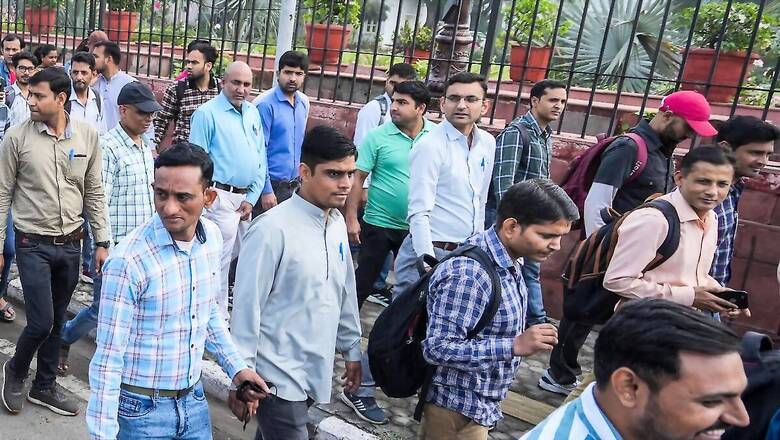
views
Ever since the introduction of the Civil Services Aptitude Test (C-SAT) in 2011, it is mired in controversies. Several UPSC aspirants demand the removal of CSAT from the UPSC CSE exam pattern. The concerns of the students which they call ‘Charter Of Demands By UPSC Aspirants’ include reducing the qualifying criteria of UPSC CSE CSAT 2023 from 33 to 23 per cent or dropping 25 plus questions that were not from the syllabus or re-conduct the UPSC prelims exam 2023.
“The demand to lower the qualifying criteria of UPSC CSE CSAT 2023 from 33 per cent to 23 per cent is a significant one. However, it’s important to note that the 33 per cent mark is a standard passing criterion followed throughout the Indian education system,” said Sumit Rewari, the CEO of Physics Wallah, Only IAS.
Also read| UPSC vs Civil Service Aspirants: From Fresh Attempts to Removal of CSAT, List of Demands by Candidates
Sheetal Bajwa, an aspirant living in Delhi also said 33 per cent is a standard passing mark that is implemented across the board in India. “Students usually don’t give importance to UPSC CSAT. They take the paper ‘for granted’ and come into panic mode as February arrive. They focus on just clearing 27 questions which ideally should not be the case,” she said.
“The number of overall vacancies remains constant. Hence, it is hard to imagine how the benefits of a lowered cut-off will be distributed vis-a-vis those who have cleared the cut-off despite this year’s difficult paper. The same issue would arise if the exam is reconducted — it would seem fair to those who could not clear the cut-off but unfair to those who cleared it,” explains former IRS Officer Ravi Kapoor.
Compensatory attempts
The aggrieved body of students has also asked for compensatory attempts for the Covid batches. Several demanded compensatory attempts for eligible UPSC candidates in 2020, 2021, 2022 and 2023. “I was not able to appear for the exam due to Covid. In fact for that year’s exam, I was prepared best and was positive that the mains would have been cracked,” Hemant Kumar, a UPSC aspirant said.
Sharing her opinion, lead petitioner Ayushi said, “Due to the pandemic many students were not able to appear for the exam and many attempts of the students have been wasted. That is why we demand one compensatory attempt for all. There are a few universities where age relaxation with extra attempts are given due to Covid. Why not UPSC?”
“Many students who cleared the exam also faced similar challenges during the pandemic. Therefore, while the demand is empathetic, it may not be practically feasible to provide extra attempts,” Rewari said.
Hindi UPSC aspirants Say Paper favourable for English Candidates
A UPSC aspirant, from Nangloi, Delhi, who opted for Hindi in the paper in UPSC that year, said, “There is an issue with prelims paper where the question is made in English and just translated to Hindi using apps. Proper and separate questions should be prepared for Hindi medium students as well.”
Ayushi said, “CSAT has become a weapon for UPSC to remove students with Humanities stream, Hindi and regional language background. Thus candidates who appear in the examination from this background are put to an uncalled disadvantage.” She also questioned the commission as to what prompted this drastic reduction of Hindi medium students.
Meanwhile, Srirangam Sriram, founder of SRIRAM’s IAS says a lot of people know the subjects and may be brilliant but they may not be advanced in the language. Thus, this is a wrong way to select and that’s why there is so much discontent among the students. “It’s best that it gets eliminated because it adds nothing in terms of personality development. The idea is to develop empathy, compassion, and soft skills are developed. The days of English are gone and it has to be shown in the UPSC CSE selection process,” he added.
Students have also raised concerns about UPSC age calculation. Aggrieved aspirants demand to opt for the 1st of January of the year candidate rather than the 1st of August. They also demanded the abolition of the lateral entry scheme that UPSC aspirants claim to promote “privatisation and contractualisation of civil services.”
“Aspirants work hard and despite the odds, struggle to compete in this daunting exam hoping to succeed. However, when they are faced with a difficulty level akin to this year’s prelims, they felt like their hard work was wasted because the exam is arbitrarily tough. The unfortunate thing about this year’s prelims paper was that reinforced a feeling of helplessness and the aspirants felt betrayed,” said Kapoor.



















Comments
0 comment